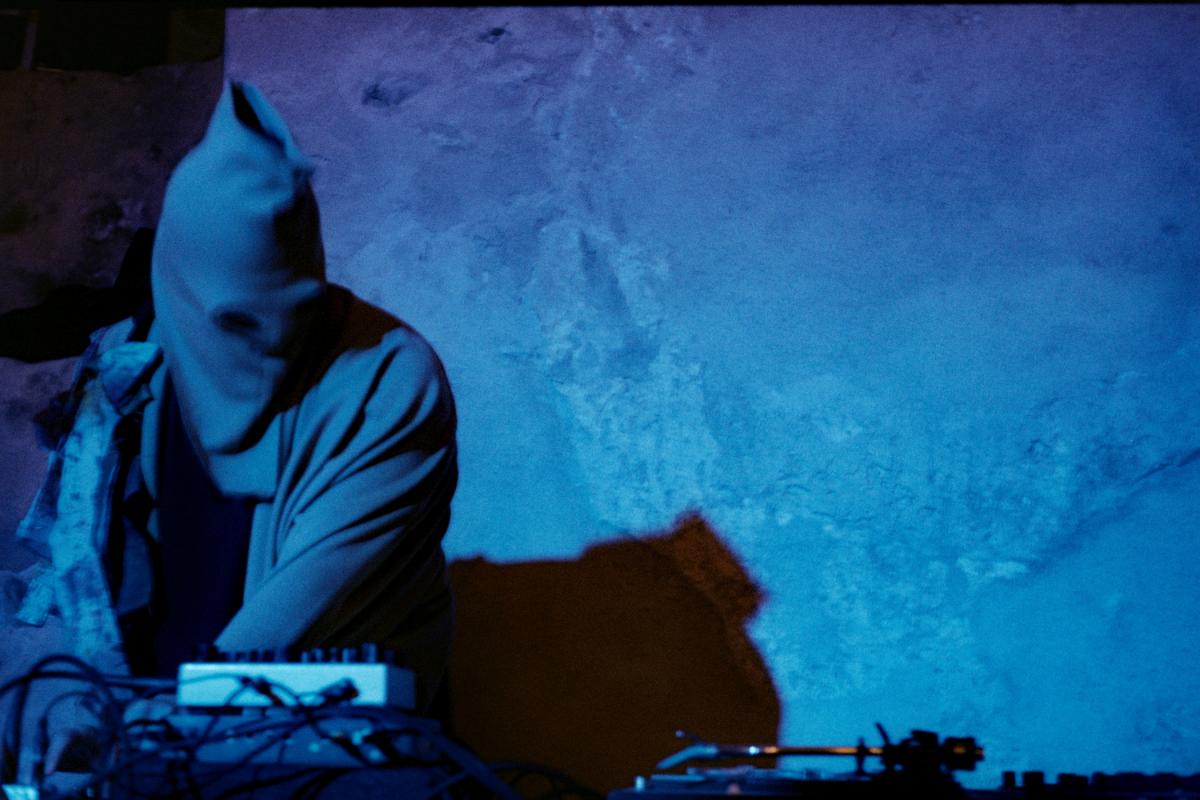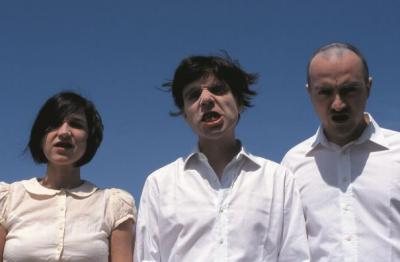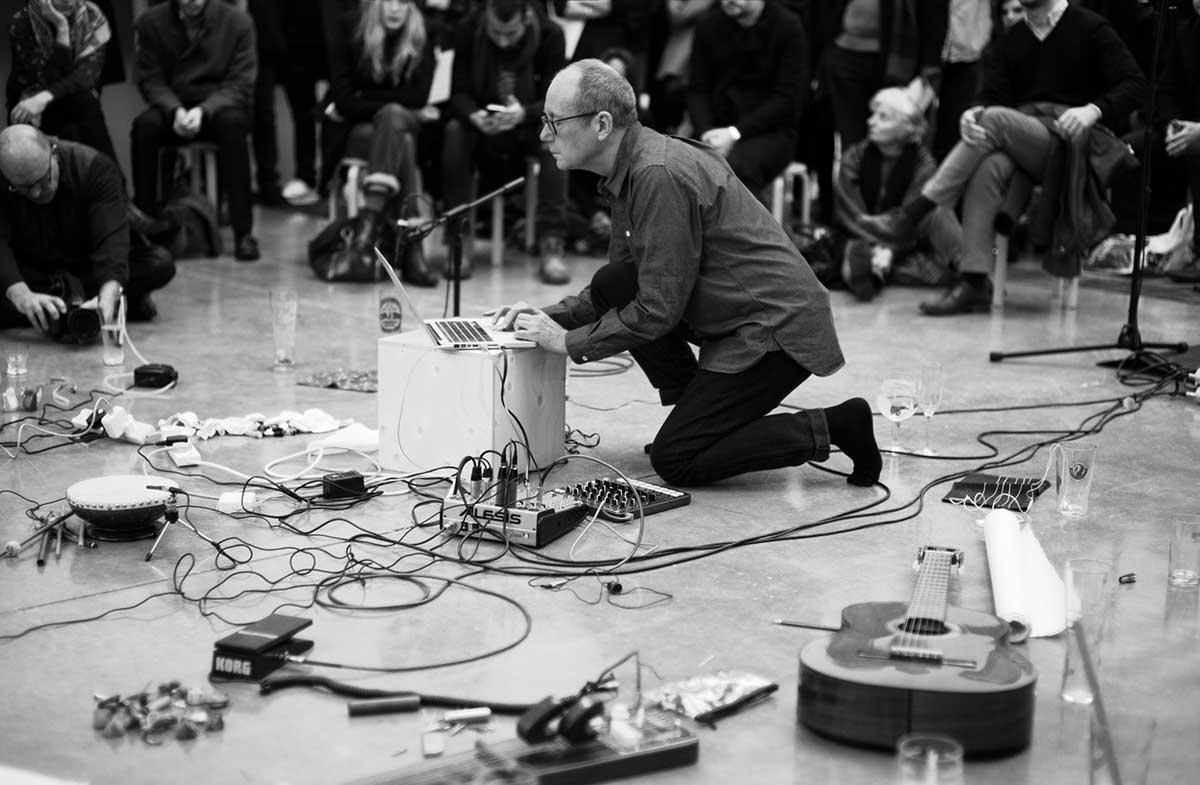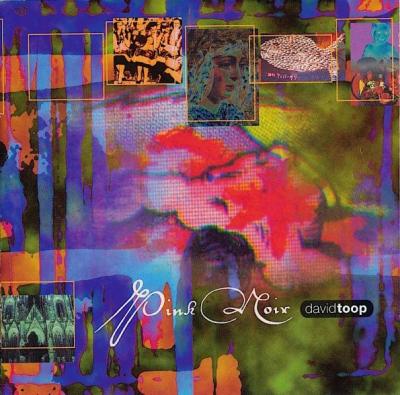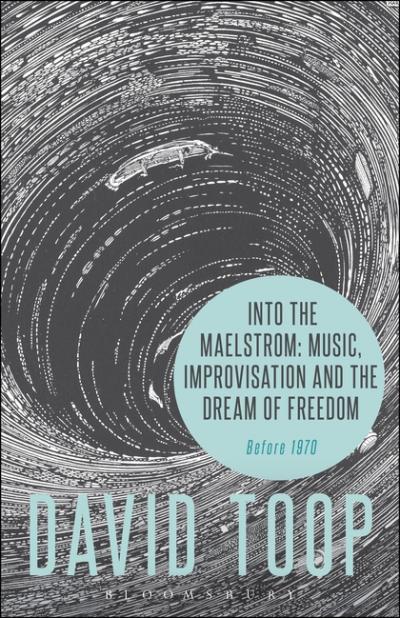«I can almost imagine my music as pop music, but for a different era of human history, maybe a history of insects». The composer and writer David Toop talks about about his interest in distortion and why he doesn't listen to music anymore.
I’m Listening
«I can remember an incident with my mother, when I was quite small». David Toop’s words are carefully measured, like he’s meticulously constructing a sonnet from thin air as he puts them together. It lends a kind of poignancy to everything he says, something that demands the listener’s attention even over the most banal of details. «My mother used to take my sister and me to my grandparents’ house. I have a vivid memory of walking alongside the railway tracks, and on the other side of the path there were concrete walls. The echo bounced back and forth quite quickly, a phenomenon known as flutter echo. And I remember the change in timbre of footsteps and voices. I’m not saying that that was the first time I thought about sound, but it’s the first incident that I can remember that I noticed something about music». While preparing for this interview with David Toop, I struggled to find much information on the composer, professor and author’s early history and even found some interviews where he purposefully avoided the question, like it was an unimportant anecdote, a useless little factoid that bears no significance to his career, but here it stands, obviously quite the landmark moment in the artist’s early life and career.
It was while writing an autobiography for a Japanese publisher towards the end of last year that would encourage Mr. Toop to reflect more on the origins of his interest in music, and would put more significance on this moment where he, as a child would come to appreciate music. I imagine a young David Toop getting lost and engrossed in the smallest of sonic events, much like we get engulfed in the incessant drone of modern life today. Whether it was his aunt’s collection of American Rock n Roll and Jazz records, or his sister’s 1950’s pop obsessions, David Toop consumed it all, and listening would inevitably lead to creating, and creating would not be exclusively resigned to music. «I wouldn’t say that everything revolves around listening. Music is an important part of it; sound is an important part; listening practise is an important part, but there are activities that move beyond those boundaries. I’m very interested in the fluidity of boundaries of practises and perception, and at the centre of it, is listening.» He would initially imagine a future as a visual artist, but after «a bit of a catastrophic time» in art school, a career in music followed based on that early interest in sound. «I was writing and painting from an early age, and all these things could’ve become central to me, but by the time I became a teenager there was something really exciting about music». The second time he dropped out of art school was to «play music» and from that moment on, a career in music as a performer, composer, journalist and author beckoned, and he made quite a profound impact in music in all these those roles today. «There was a strong connection between the artwork I was interested in, the literature I was interested in and my approach to sound».
For a Language to Come
His books, which include Ocean of Sound and Haunted Weather have become essential reading in the modern discourse of music, while his recorded and performed musical works, like Pink Noir and Of Leonardo Da Vinci – Quills/ A Black Giant / Deluge mark as some of the most forward-thinking examples in that same musical discourse. He would go on to make an incredible contribution to recorded music ever since 1975’s New & Rediscovered Musical Instruments, a collaborative project with Max Eastley, which also marks as one of the first artistic interpretations of a kind of library-music, the type of thing that would eventually lead to the style of ambient music championed by contemporary artists like Brian Eno. It’s music born out of an era that was pretty fertile for experimentation in music, an era that would see David Toop first encounter AMM, a group that he would mention on more than one occasion in the past and a performance that seemed to play a fundamental role in his own musical development.
Even when talking to Mr. Toop today, you can hear some excitement in his voice when he mentions the name and the performance. «In 1966 I heard AMM improvising and it was pretty radical in the context of a rock concert». It coincides with a time where his own creative endeavors ventured into new territory too. «I was playing in this band – it wasn’t a very good band, we never played live. We rehearsed a few times and I remember one rehearsal we were playing a Bo Diddley tune called ‹I’m a road runner› and I was playing with a bottleneck, which just started to wander over the strings. The rest of the band were horrified and shocked and I was really surprised. I thought; ‹ah this is where I can go with this amplified sound› and that sticks in my mind as a moment of revelation». That moment of revelation in the experimental aspects of music is what Mr. Toop has pursued for his entire career since, favouring the road less travelled through improvisation and new sonic palettes that have incorporated bold adventures in electronic music since the seventies.
The experience, the attitude and the nature of David Toop’s music all created something unique across four decades and in 2016 it’s more monumental than ever as he releases his first album in a decade called Entities Inertias Faint Beings. There’s something ominous about the record, as hollow pounding percussion and dissonant sonic echoes of some digital arthropod vie for your attention. In this sonic ecosystem Mr. Toop has created a new world, and I find it quite surprising, when early during our conversation, he mentions that he doesn’t «listen to music anymore». For an artist whose whole career is clearly is evidently built on the practice of listening and whose music encourages such an intense listening experience it comes as quite a revelation. «When I was younger, I was hungry for music, listening to every type of music, trying to understand it and being profoundly affected by it. You get to a point where things become very familiar. I would say, and I’d like to be proved wrong, that it would be very hard to surprise me now.» I recall Brian Eno through these words in a sort of indirect manner, and a quote comes to mind of that ambient artist and creating music that is as ignorable as it is interesting and I wonder if Mr. Toop conjures this quote when he thinks of music that doesn’t surprise him anymore and where he thinks his music fits into that spectrum. «It’s a very contentious quote», remarks the man that has spoken to Mr. Eno about this quote on more than one occasion I imagine. «He talked about ambient music being ignorable, but people listened to it. Any music can be ignorable. God knows we are surrounded by music. I go to Heathrow airport and it’s just drowning in music, and to stay sane you have to ignore it». But for Mr. Toop the music on Entities Inertias Faint Beings is «going to be fairly pointless if you don’t listen to it».
We almost didn’t get the opportunity to hear it at all. David Toop had for all intense and purposes taken a permanent hiatus from the recorded format, and for some time his unreleased recorded works had just been gathering digital dust on a hard drive somewhere. «I was struggling with the idea of why would you release music. Ever since the whole CD thing collapsed, it seemed a kind of retrogressive step to put together this old fashioned entity called a LP». Sitting on all this music isn’t favourable either and the artist was constantly turning over this issue in his mind. «My connection with music was becoming very tenuous. I was making a lot of music, but nobody was hearing any of it». Enter the saintly Lawrence English from Room 40, who during a conversation in a car in Australia convinced Mr. Toop otherwise. «He said, ‹it never goes away, that need to publish.› I find it hard to convince myself, but when someone puts forward a good case like that I think yeah, they’re right». It’s thanks to this auspicious moment and Mr. English’ involvement that we have Entities Inertias Faint Beings on Room 40 today. David Toop coming to terms with the recorded album format in the 21st century, isn’t the only premise for it’s existence and a host of other extenuating circumstances exist around the origin of this record, which impart a lot of depth and «a lot of personal meaning» to the final product.
Isolation and Intimacy
«I was recovering from a traumatic event in my life». Through our time together in a digital, auditory realm, I detect hints of exhaustion emanating from a hidden sadness in David Toop’s voice from time to time. Even his intermittent breathy chuckles are masked by some palpable tragedy that is hard to ignore. It’s a subject we never breach during the conversation, but if it were of great consequence to this interview, David Toop strikes me as the type of person that would go into detail if necessary. I leave the comment hanging there in the air, like some universal truth that ties it all together and with its own origins irrelevant to the rest of the universe we’ve created here. It was this traumatic event that resulted in three periods of isolation, two of which were to be in Australia courtesy of Lawrence English. «His Idea was that it would be a writing residency, and I didn’t write a word»; the breathy chuckle rising through its scale as Mr. Toop punctuates the sentence suggests that perhaps guilt had something to do with his decision to release a record on Room 40.
Instead the author used his time to get back to those activities that have always played such a fundamental role in his own progression as an artist. «I did a lot of thinking and I did a lot of listening and I did a lot of reading, and I did a lot of sleeping and just gazing out of windows. It was almost allowing things to come to the surface». One particular event on Tambourine mountain in Australia then played a significant role in the orchestration of the record that would eventually gestate out of these moments of isolation and yet again we find the practice of listening inform the composer’s work. «I was listening to birdsong in the daytime and at night it was cold and I was completely alone and it was silent. I was listening to music, to this music that I’d been listening to in a very intense way for the last forty-five years. Going deep into it, going into some kind of trance, almost like I was taking some kind of drug and I found it extraordinary. Normally I don’t have time anymore, to listen with that degree of attention. I think reawakening my fascination with those styles of music was an important part of this record».
A moment like this, a solitary moment between just you and the music, is a very intimate moment, an aspect of listening to music and composing music that is very central to Mr. Toop’s own creative practices. «One of the things that interests me is intimacy. How can we create intimate experiences? I think the implication from that is that listening can be a very intense and intimate experience». It’s something that he not only unintentionally conveys on the record with its moments of tension and resolution continuously drawing you closer to the music, but something that is imbedded in the very fibre of the record. Mr. Toop remembers specific examples where intimacy played a significant role in the recordings used on the album. The first was recording Rie Nakajima and her battery operated machines in his study. «At one point I was using the microphone as a drawing instrument on the paper pushing these things around. There was something close and intimate about that».There was also a recording session with saxophonist John Butcher, which he recalls quite vividly too. «He’s got a tiny room», remarks Mr. Toop of Mr. Butcher’s practise studio, «and we were crammed in there together. John’s playing is extraordinary. What he does is very powerful and intense, and there we were – me with my headphones, my laptop and the microphone, and him, doing this extraordinary high-pitched stuff. Again, just being enfolded in that sound and being in close proximity, there’s a physical intimacy just to creating it, let alone the characteristics of the music itself».
A record would eventually come together when Mr. Toop was in Cornwall during a third period of isolation. With the intention still to write, Mr. Toop yet again didn’t write a word. («I’m being told something there of going away in isolation, I don’t write».) He was instead distracted by some of those recordings that were gathering cyber-dust somewhere buried deep in his computer. «I started to think about all these audio files that were on my laptop that were like orphans in a way. I started to put them together». These disparate recordings came as one in the context of these periods of isolation; Mr. Toop’s personal experiences at the time; and various indirect forces (we’ll call upon later), pulling at the fabric of the record. «I started to think of what I was reading, the notes I was making, the films I was watching and the atmosphere of the place». An album took final form when some of these audio files joined new recordings and David Toop’s broad brush painted over them, unifying them as one. «They became quite cohesive through a kind of intensity of vision at the time. Maybe isolation had something to do with it, maybe it was cumulative». Cumulative influences that come through on the album can go from Mr. Toop’s early experiences of R&B and blues, and investigating «the situation out of which this music had grown up», to works of visual art. «For my last book, Sinister Resonance I was looking at a lot of 16th and 17th century painting and one of the things that affected me was this idea of darkness in some of these paintings. And I think some of that darkness is in this record – I don’t know how, but I can tell it’s there».
I use the word influence a lot when I talk to Mr. Toop about what could have affected the final result of the record, but the more we talk about it, the more it becomes clear that there many different aspects on the record that are not quite influences but just gravitational objects pulling the record into one direction. There are these various distant planets of thought, experience and inspiration that push the record into orbit around the individual at the centre of it all. As one example on the album, Setting Stones is born out of the idea of setting stones in a Japanese Garden and its association with taboos. «In the end that structural placement of stones becomes very difficult», says Mr. Toop of his own experiences of the horticultural tradition, which also has some relevance to the artist creating music in the computer. «You’re working with increments of proportion and your working on different textures to bring them together and all of that is close to Japanese Gardening ideas». As much as that track is influenced by an idea of Japanese Gardens, «it’s also about depth, because the main sound in that piece is underwater recordings» taken from Mr. Toop’s garden pond. «So it’s really about me making a pond in the garden and then sitting there last summer, watching all the frogs and various creatures swim around in the water and getting a hydrophone and recording it. So it’s all about how you live your life».
Improvising the Future
These various aspects all inform the work at the end of the day, but at the same time there’s no single idea to Entities Inertias Faint Beings. «There’s never a single idea to everything I do, my thinking is too messy for that. There’s too much going on, there’s too much that’s contradictory. It’s the way things are juxtaposed that may be important». One compelling form of juxtaposition is the way a compositional structure is the result of what is born out of pure improvised moments at Mr. Toop’s hands. Improvisation is something that has always informed his work, and its something that in this writer’s opinion has given the music a very futurist aesthetic, especially on this latest album. It’s like the music of an imminent future that’s always just one step ahead of you, and this imparts a kind of timelessness to the music. «In a way it’s preferable to make music that you can’t remember».
This is something that appeals to David Toop’s personal tastes and especially the strong relationship he has with Japanese Gagaku. «If I think to the music that’s really lasted for me, and that I continue to listen to, even in periods when I don’t listen to music, it’s the music I can hardly remember». Mr. Toop prefers the unpredictability of improvisation over the redundancy of formulated popular composition forms and it’s something that I find keeps making me return to the album, while composing this interview. It’s an endearing quality to the music, one that draws you in closer to the music every time you want to reacquaint yourself with some of the songs. «You have to engage in it in a different way and arguably you have to engage with it in a more intense and intimate way». David Toop has worked in improvisation for a long time and at the time of our conversation he’s just published a book that delves into the subject. «It’s called Into the Maelstrom and it’s about free improvisation».
Although free improvisation has played a fundamental role in David Toop’s music since the seventies, it’s also the investigative aptitude he applies to this music that pushes it into regions where we can truly apply the experimental tag to his work. It stems from David Toop’s relentless pursuit, both musical and otherwise to pick at the threads of the familiar to find new and exciting means for musical expression. «Most of the things I hear, that are called experimental, I’ve heard already». Specifically in For a language to come Mr. Toop approaches the subject on the record through a Japanese art-movement. It’s «taken from a photo book, by an amazing Japanese photographer, Takuma Nakahira». Nakahira was part of a group of photographers engaged in visually interpreting the turbulent conditions of Japan in the sixties and published a magazine called Provoke. «I found a strong relationship with these photographs, partly because of talking to Rie Nakajima. All of that blurring and movement, it seemed to relate to my own interest in distortion. It felt quite close to the style of photography by these Provoke photographers. For a language to come was an acknowledgement of their work, but it was also a suggestion of the idea that we think beyond the idea of experimental, which is kind of a safe genre in itself».
Post Human
David Toop finds a language in music that not only surpasses the here and now, but also at times this version of our reality, it seems. His music has always taken on this unearthly quality, but especially through his more recent works like Of Leonardo Da Vinci – Quills/ A Black Giant / Deluge and now Entities Inertias Faint Beings. The textures and the shapes of the composition take on eerie properties in the work, where they become some style of alien sonic event transmuted from our tangible space, and distorting what we’ve come to know as nature. Much of this is captured on the record and gestated within period of isolation in Cornwall, while reading Timothy Morten’s book «Hyperobjects». «In Hyperobjects», he’s proposing different ways to think about the world, or different ways in the future the world would be perceived or experienced. I’ve always had the good fortune to work with, or be friends with artists, musicians and thinkers who proposed radical different ways of perceiving the world». Morten writes about music and experiencing time and objects differently, even citing David Toop’s «Haunted Weather» when he speaks of these things in the context of music. «He talks about there being no such thing as nature, which I liked. Human beings are nature, so the idea of nature being outside of us, something outside as green fields and trees and so on has always seemed false. I had this feeling through the intensity and the intimacy of working through the sounds I was working with, that sounds were growing, that I was giving birth to something – I was growing something in a Petri dish and they’ve become something that begins to feel as if it’s beyond you».
This living entity that exists beyond the humanity of the artist is the record we have with us today and this music is almost a style of post-music, a futuristic creative form of expression, that is yet to come. «I can almost imagine my music as pop music, but for a different era of human history, or not even human history, maybe a history of insects. Maybe you’re just making music for a completely different state of mind, or physical state».
David Toop is 67 today, and he says he is really happy that the record’s seeing the light of day, and that he took Lawrence English’ advice on the matter. «It can sell five copies, but I don’t mind». It’s part of something larger than a single record as Mr. Toop’s inexorable and determined vision of music transcends the here and now even today. «I’m still learning, still struggling with these issues, I’m still finding new things. I would think the point that that stops for me, is probably I’ll die». The name Lawrence English makes yet another appearance towards the end of conversation as he says this, a fundamental protagonist in the plot of Entities Inertias Faint Beings, one who without it’s story would never have been recorded. «Lawrence said this fantastic thing to me when we were driving along. He said; when you die, you’ll have a lot of unfinished projects. I just laughed. It was such a brutal thing to say. Most people wouldn’t be that honest. It was recognition of the fact that I’m constantly trying to open my eyes and challenge myself. I’m constantly trying to develop my ideas. If you continue to do that you eventually have a lot of unfinished ideas».
Although David Toop had just finished yet another book, he’s already embarking on the second volume that takes the story of free improvisation, further and up to the present day. It’s taken him decade to return to the recorded format, and who knows when we’ll get a chance to hear the next record, but we’re quite content on letting this one linger with us for some time to come, indulging the intimate moments it has to offer. At this point it feels like our conversation has come to a natural conclusion, but I have more question for Mr. Toop. I’d like him to define music on the back of his lifetime’s worth of experience. He doesn’t feel it necessary to define music however, preferring yet again the fluidity between the boundaries of its definition, but as he tells me this, he suddenly looses momentum in his argument and drifts off into, «uhm... music... yeah its...»
